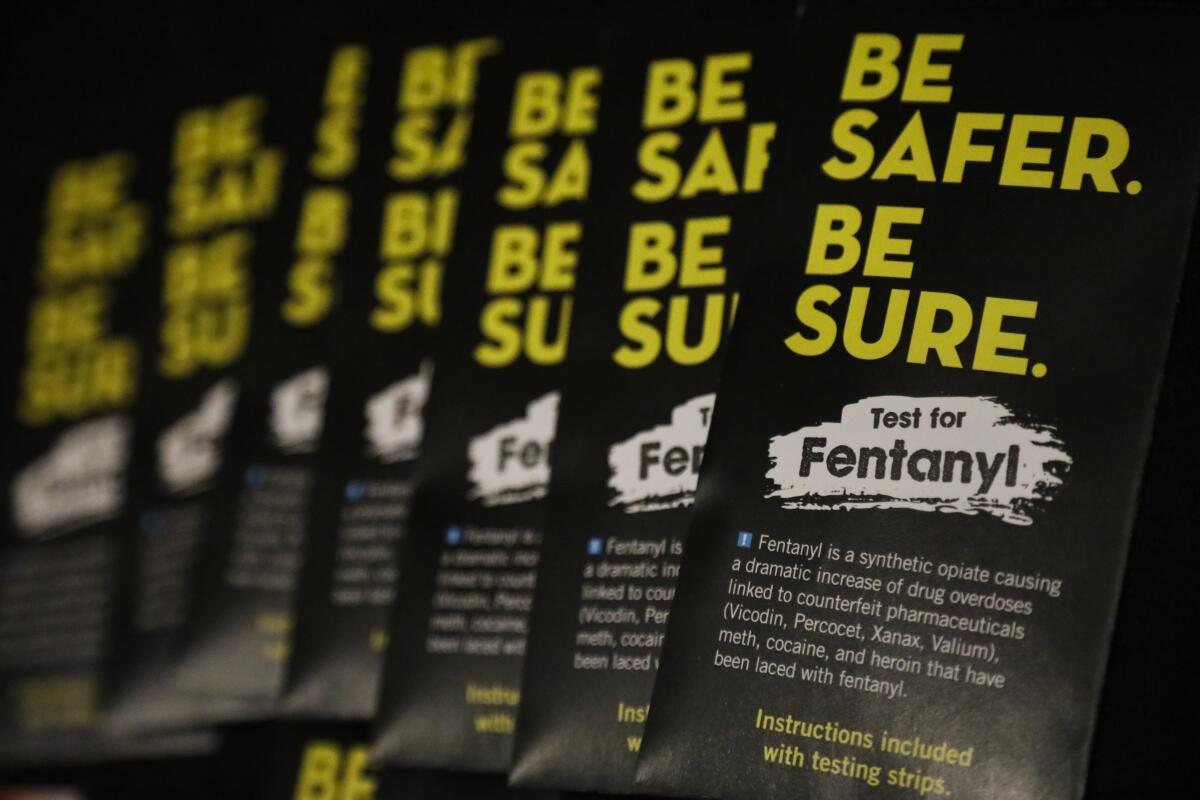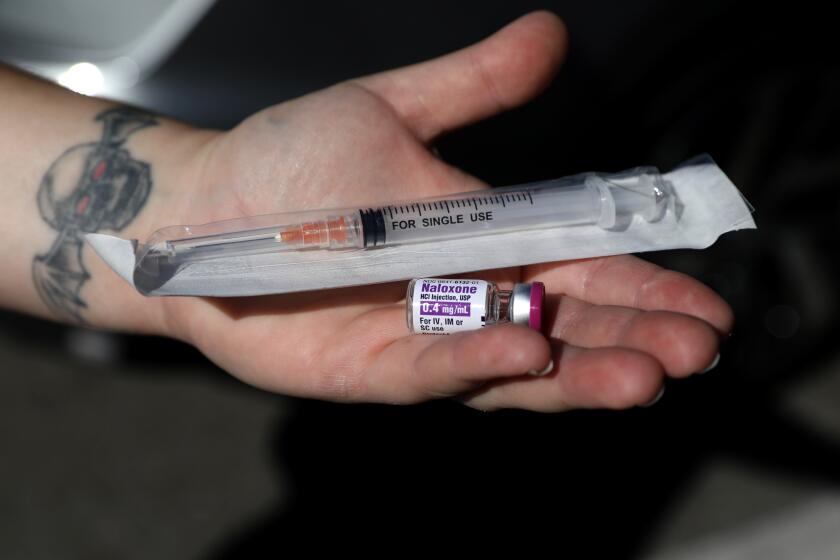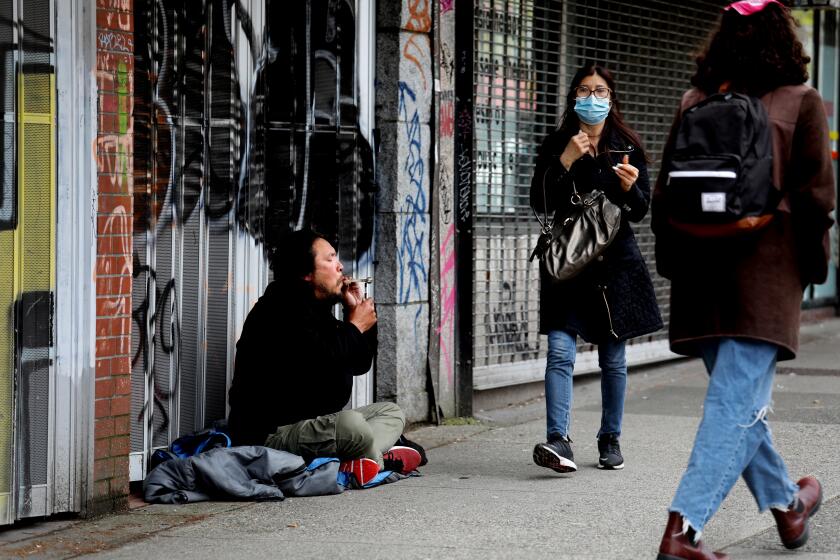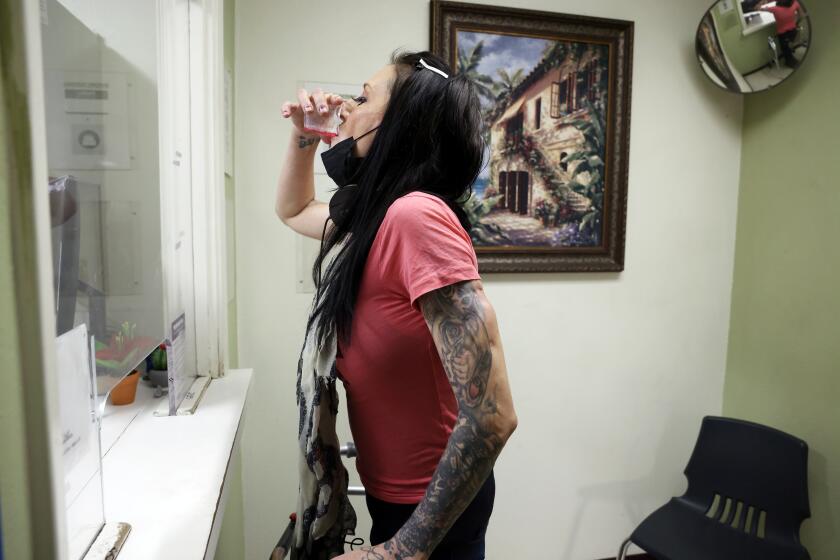With overdose deaths rising, here’s how to test drugs for fentanyl

- Share via
During the height of the pandemic in 2020, USC neuroscience student Isabella Gianatiempo said, one of her peers died after unwittingly taking a lethal mixture of drugs. The death sparked a conversation about the increased number of drug-related overdoses — three of which were linked to drugs containing fentanyl — on the school campus.
Gianatiempo, Madeline Hilliard and three other students wanted to do something about it, and they believed the root of the issue was a lack of education about drugs. They created TACO, which was short for Team Awareness Combating Overdose, a nonprofit with the goal of preventing accidental overdose deaths through research-based education and accessible harm-reduction supplies on college campuses.
The problem isn’t confined to colleges. According to the California Department of Public Health’s most recent data, L.A. County experienced 1,300 opioid-related overdose deaths in 2020.
And it’s getting worse. The number of overdose deaths in the U.S. from fentanyl and other synthetic opioids grew 22% in 2021.
This month three men were found dead in downtown Los Angeles after ingesting fentanyl; in April a 28-year-old died and two more people were hospitalized in South Los Angeles after ingesting drugs that contained fentanyl.
Fentanyl has some legal applications; for example, it may be prescribed to patients with chronic pain after surgery. But the illicit use of fentanyl can be deadly.
The state and L.A. County have worked hard to make Naloxone more widely available. One of the hurdles, though, has been the price of the inhalable version, Narcan.
And many times, people will take the drug without realizing it. Fentanyl is mixed with other drugs (including heroin, methamphetamine and cocaine) to increase potency, and sometimes it is sold as powders or pills made to look like legitimate prescription drugs, the U.S. Drug Enforcement Administration has said.
Ed Ternan, co-founder of Song For Charlie, said counterfeit pills are a huge problem that most people don’t know exists.
“These fake pills are everywhere, to the point that if you get a pill online or anywhere that didn’t come directly from your doctor, you pretty much can assume that it’s counterfeit. And if it’s counterfeit, it’s made with fentanyl,” Ternan said.
Ternan and his wife, Mary, created Song for Charlie after their youngest son died in May 2020. He took a black-market pill he thought was the prescription painkiller Percocet, but in fact was made with fentanyl.
Song for Charlie’s mission is to warn young people about the prevalence and dangers of fake pills.
The issue has even reached the Senate floor, as Sens. Dianne Feinstein (D-Calif.) and Charles E. Grassley (R-Iowa) moved to designate May 10 as National Fentanyl Awareness Day, a resolution that was unanimously approved.
Raising awareness is one way to prevent overdoses. Other tools include fentanyl test strips, as well as resources for reducing or eliminating unhealthy substance use. Here are some tips for finding and using the test kits.
For years, this Canadian city has hosted safe consumption sites for addicts. They’ve saved lives, but with some painful tradeoffs.
How do you use fentanyl test strips?
If you have a drug that wasn’t legitimately prescribed and supplied to you by medical professionals, use a test strip prior to ingestion to check whether it contains fentanyl.
According to TACO, different types of drugs require different preparations for better test accuracy:
- Powders: Shake and thoroughly mix in the bag that the drug came in. Any chunks need to be broken up.
- Crystals: Crush into a fine powder and mix thoroughly.
- Pills: Crush into fine powder and mix thoroughly.
Then, combine about a spoonful of water and a small amount of the drug (TACO suggests using a sample about the size of a strawberry seed). Put the test strip into the mixture, holding it by the solid blue end and inserting it no farther than the thick blue “MAX” line. The number of seconds it takes to complete the test will vary, so follow the directions on the kit or the instructions given to you by the organization providing the strip.
A single colored line is a positive result, meaning fentanyl is present and you shouldn’t consume the drug. A double colored line is a negative result.
Ternan argued that fentanyl test strips should be legal and easily available throughout the U.S. because they can be effective harm reduction tools when used properly. But drug users and experimenters need to perform the tests themselves, he said.
“Younger people who are not as savvy can be lulled into a false sense of security just knowing that there’s such a thing as fentanyl test strips on the market because it allows dealers to say, and they have, ‘I tested my pills. You don’t have to worry,’” he said. “That’s not true.”
He reiterated that if a drug is presented to you in the form of a pill, it has not been tested for fentanyl because “you have to destroy the pill to test it right.”
When people on L.A.’s skid row want to try to wrench free from opioid addiction, the closest options for getting daily methadone may be miles away.
Where to get test strips
Los Angeles LGBTQ Center
The center provides free fentanyl test strips to those who request them. It also provides free or low-cost, comprehensive, judgment-free addiction recovery services. For more information, email [email protected] or call (323) 993-7448.
APLA Health
APLA Health has multiple locations throughout Los Angeles County that offer test strips, including Koreatown, two locations in Baldwin Hills, Mid-Wilshire, downtown L.A. and Long Beach. It also offers treatment that can help reduce or eliminate behaviors that sustain addiction and substance use. For more information call (323) 215-1725 or visit aplahealth.org/fentanyl.
TACO
The nonprofit provides pickup and delivery options for 1-cent test strips on university campuses, including UC Berkeley, USC, UCLA and UC Santa Barbara. TACO partners with delivery apps Duffl and Handle. Or you can pick up a test at a location listed on TACO’s website.
End Overdose
The organization provides training and tools to treat people who overdose and prevent death through education, medical intervention and public awareness. It sells packages of five fentanyl testing strips online for $7.99. Each package comes with a QR sticker that when scanned leads to directions on how to use the test strips.
About The Times Utility Journalism Team
This article is from The Times’ Utility Journalism Team. Our mission is to be essential to the lives of Southern Californians by publishing information that solves problems, answers questions and helps with decision making. We serve audiences in and around Los Angeles — including current Times subscribers and diverse communities that haven’t historically had their needs met by our coverage.
How can we be useful to you and your community? Email utility (at) latimes.com or one of our journalists: Jon Healey, Ada Tseng, Jessica Roy and Karen Garcia.
More to Read
Sign up for Essential California
The most important California stories and recommendations in your inbox every morning.
You may occasionally receive promotional content from the Los Angeles Times.














